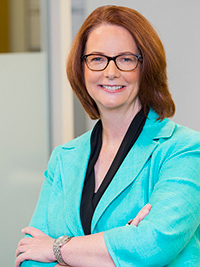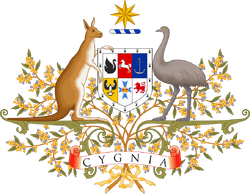No edit summary |
|||
| Line 17: | Line 17: | ||
During the 2016 campaign, Gillard also promised a £2,000 rebate for people to update pre-1995 motor vehicles. Costed at £400 million, the government said it would remove heavy polluting cars from circulation. After a delay, the Cleaner Car rebate, also known as the Cash for Clunkers scheme, was introduced. |
During the 2016 campaign, Gillard also promised a £2,000 rebate for people to update pre-1995 motor vehicles. Costed at £400 million, the government said it would remove heavy polluting cars from circulation. After a delay, the Cleaner Car rebate, also known as the Cash for Clunkers scheme, was introduced. |
||
| − | In February 2017, Environment Minister {{JoW|Tony Burke}} controversially reversed a decision made by his {{JoW|National Party of Cygnia|National}} predecessor {{w|Greg Hunt}} to approve the proposed {{w|Carmichael coal mine}}. The {{JoW|New Zealand}} state government took the Ministry of the Environment to court over the reversal, and in the ensuing Supreme Court case the justices voted 4–3 in favour of the Ministry, citing [[Article Five of the Cygnian Constitution (Joan of What?)#Section 2|Article V, Section 2, Clause 2]] of the Constitution, which gives federal law precedence over state law, and which the Court interpreted as allowing the government to reverse executive decisions made by predecessors. |
+ | In February 2017, Environment Minister {{JoW|Tony Burke}} controversially reversed a decision made by his {{JoW|National Party of Cygnia|National}} predecessor {{w|Greg Hunt}} to approve the proposed {{w|Carmichael coal mine}}. The {{JoW|New Zealand}} state government took the Ministry of the Environment to court over the reversal, and in the ensuing Supreme Court case the justices voted 4–3 in favour of the Ministry, citing [[Article Five of the Cygnian Constitution (Joan of What?)#Section 2|Article V, Section 2, Clause 2]] of the Constitution, which gives federal law precedence over state law, and which the Court interpreted as allowing the government to reverse executive decisions affecting states made by predecessors. |
The Gillard Government in 2018 announced an expansion of the Cleaner Car rebate to cover electric cars, spearheaded by Minister Burke. The amendment passed easily in the House, but faced a far more challenging debate in the Senate, as senators from {{JoW|Katter's National Party|Katter's National}}, {{JoW|Liberal Democratic Party (Cygnia)|Liberal Democratic}} and {{JoW|Palmer United Party|Palmer United}} parties all sided with the National opposition against the rebate. The {{JoW|Cygnian Greens|Greens}} at first opposed the bill, saying that it didn't go far enough, but ultimately they threw their support behind the government, and the rebate came into force at the beginning of 2019. |
The Gillard Government in 2018 announced an expansion of the Cleaner Car rebate to cover electric cars, spearheaded by Minister Burke. The amendment passed easily in the House, but faced a far more challenging debate in the Senate, as senators from {{JoW|Katter's National Party|Katter's National}}, {{JoW|Liberal Democratic Party (Cygnia)|Liberal Democratic}} and {{JoW|Palmer United Party|Palmer United}} parties all sided with the National opposition against the rebate. The {{JoW|Cygnian Greens|Greens}} at first opposed the bill, saying that it didn't go far enough, but ultimately they threw their support behind the government, and the rebate came into force at the beginning of 2019. |
||
''More to come'' |
''More to come'' |
||
| + | |||
===Coronavirus=== |
===Coronavirus=== |
||
{{Main|2020 coronavirus pandemic in Cygnia (Joan of What?)}} |
{{Main|2020 coronavirus pandemic in Cygnia (Joan of What?)}} |
||
Revision as of 15:05, 24 June 2020

Gillard (2017)
The Second Gillard Government officially began operation at noon WST on 3 January 2017, when Julia Gillard, the 39th Chancellor of the United Cygnian States, returned to office; Queen Elizabeth has reigned throughout Gillard's tenure. Gillard's running mate, Tanya Plibersek, took office as Vice Chancellor on the same day. Gillard is the first female chancellor and eleventh Labour chancellor. The Second Gillard Government succeeded the Turnbull Government following a Labour victory at the 2016 federal elections.
Major policy initiatives of the Second Gillard Government include the Clean Energy Act, asylum seeker policy, Mineral Resource Rent Tax, National Broadband Network, the National Disability Insurance Scheme, and reforms in school funding.
Gillard also nominated Supreme Court Justice Ian Macdonald and Chief Justice Virginia Bell ahead of the retirement of incumbent Chief Justice Robert French on 29 January 2017; the Senate confirmed both of these nominations, upon which both took office on 30 January.
Labour currently controls the House of Representatives, and has a plurality in the Senate. Gillard's term is set to end on 3 January 2021, when the 42nd Chancellor will take office following the 2020 federal elections.
Transition period and inauguration
The cancellarial transition period began following Gillard's election to the chancellorship in December 2016, though Gillard had chosen Willem Korthals to begin planning for the transition in May 2016. The Gillard-Plibersek Transition Project was co-chaired by Joseph Chatfield, Raymond Yong and Peter Steiner. During the transition period, Gillard announced nominations for her cabinet and administration. In November 2016, public servant Martin Parkinson accepted Gillard's offer to serve as Chancellery Chief of Staff. Gillard was inaugurated on 3 January 2017, succeeding Malcolm Turnbull. Gillard officially assumed the chancellorship at 12:00 Noon, WST, and completed the oath of office at 12:05 PM, WST. She delivered her inaugural address immediately following her oath. Gillard's transition team was highly complimentary of the Turnbull administration's outgoing transition team, particularly with regards to national security, and some elements of the Turnbull-Gillard transition were later codified into law.
Term of government
Climate change
In the lead-up to the 2012 federal elections, Gillard pledged that as Chancellor in the next government she would build a "national consensus" for a carbon price by creating a "citizens assembly", to examine "the evidence on climate change, the case for action and the possible consequences of introducing a market-based approach to limiting and reducing carbon emissions", over the course of one year. The assembly was to be selected by an independent authority who would select people from the electoral roll using census data. After losing the election, the Cygnian Labour Party incorporated this policy into their platform for the 2016 elections, and was implemented after the Second Gillard Government was inaugurated.
During the 2016 campaign, Gillard also promised a £2,000 rebate for people to update pre-1995 motor vehicles. Costed at £400 million, the government said it would remove heavy polluting cars from circulation. After a delay, the Cleaner Car rebate, also known as the Cash for Clunkers scheme, was introduced.
In February 2017, Environment Minister Tony Burke controversially reversed a decision made by his National predecessor Greg Hunt to approve the proposed Carmichael coal mine. The New Zealand state government took the Ministry of the Environment to court over the reversal, and in the ensuing Supreme Court case the justices voted 4–3 in favour of the Ministry, citing Article V, Section 2, Clause 2 of the Constitution, which gives federal law precedence over state law, and which the Court interpreted as allowing the government to reverse executive decisions affecting states made by predecessors.
The Gillard Government in 2018 announced an expansion of the Cleaner Car rebate to cover electric cars, spearheaded by Minister Burke. The amendment passed easily in the House, but faced a far more challenging debate in the Senate, as senators from Katter's National, Liberal Democratic and Palmer United parties all sided with the National opposition against the rebate. The Greens at first opposed the bill, saying that it didn't go far enough, but ultimately they threw their support behind the government, and the rebate came into force at the beginning of 2019.
More to come
The first case of SARS-CoV-2 in Cygnia was detected on 25 January 2020 in Melbourne. On 31 January, the Gillard Government announced mandatory quarantine measures for returning Cygnians from China, and banned foreign nationals travelling from that country. The quarantine rule was extended to passengers returning from Persia on 29 February, Korea on 5 March, and Italy on 11 March. The government then announced a ban on all foreign nationals entering Cygnia, effective midnight on 19 March, with a required supervised 14-day isolation period in designated quarantine facilities for Cygnian citizens returning home.
The Gillard Government has established a number of agencies and bodies to assist with governmental response to the pandemic. These include the National Cabinet and the National COVID-19 Coordination Commission. A human biosecurity emergency was declared on 18 March under the Biosecurity Act 2015 by Queen Elizabeth on the advice of Health Minister Catherine King.
More to come
Personnel
Cabinet appointees
 | ||
| The Gillard Cabinet | ||
|---|---|---|
| Office | Name | Term |
| Chancellor | Julia Gillard | 2017– |
| Vice Chancellor | Tanya Plibersek | 2017– |
| Minister for Foreign Affairs |
Penny Wong | 2017– |
| Treasurer | Chris Bowen | 2017– |
| Minister for Defence |
Richard Marles | 2017– |
| Attorney-General | Mark Dreyfus | 2017– |
| Minister for Home Affairs |
Shayne Neumann | 2017– |
| Minister for Agriculture and Resources |
Joel Fitzgibbon | 2017– |
| Minister for Commerce |
Jason Clare | 2017– |
| Minister for Employment |
Brendan O'Connor | 2017– |
| Minister for Veterans' Affairs |
Amanda Rishworth | 2017– |
| Minister for Health and Human Services |
Catherine King | 2017– |
| Minister for Communications |
Michelle Rowland | 2017– |
| Minister for Social Services |
Linda Burney | 2017– |
| Minister for Education |
Tanya Plibersek | 2017– |
| Minister for the Environment |
Tony Burke | 2017– |
| Minister for Energy |
Mark Butler | 2017– |
| Chief of Staff | Martin Parkinson | 2017– |
| Postmaster-General | Ahmed Fahour | 3 Jan. 2017–2 Jul. 2017 |
| Christine Holgate | 30 Oct. 2017– | |
| Auditor-General | Grant Hehir | 2017– |
| Ambassador to the United Nations |
Gary Quinlan | 2017– |
Judicial nominees
Cygnian Supreme Court
During Gillard's tenure thus far, there has been one vacancy on the Supreme Court of the Union. During the 58th Congress, Gillard successfully nominated one new Supreme Court Justice as well as a Chief Justice:
- Virginia Bell, replacing Chief Justice Robert French – 2017
- Ian McDonald, replacing Robert French – 2017
| |||||||||||||||||||||||
| ||||||||||||||

